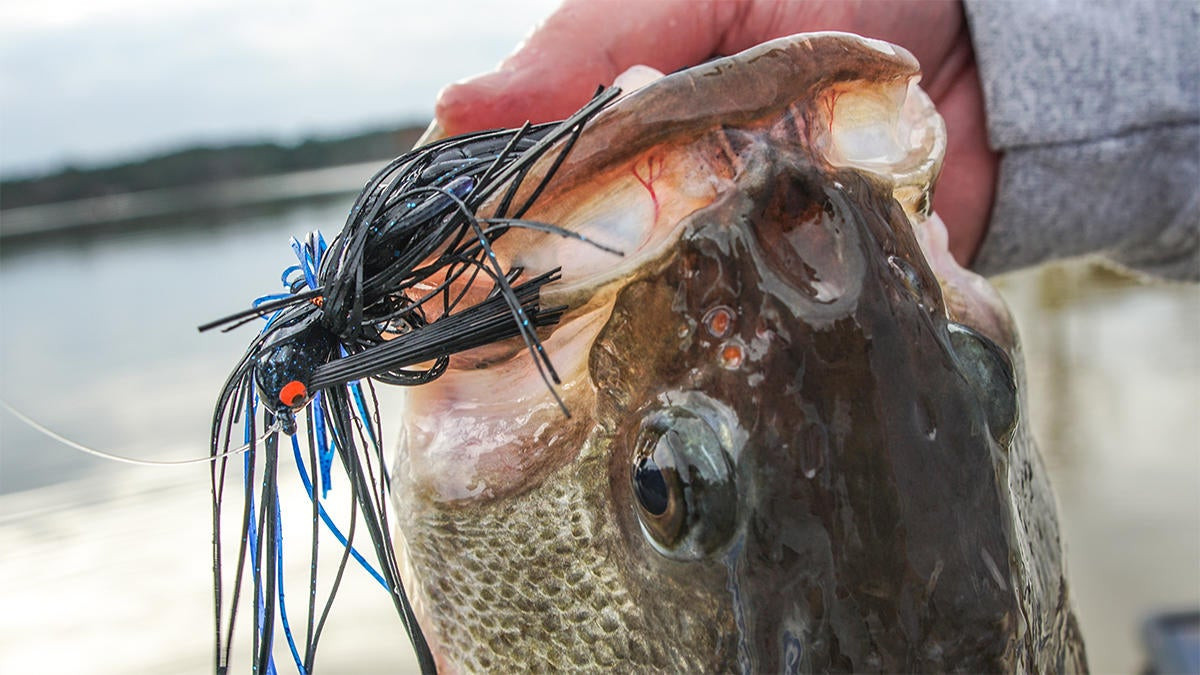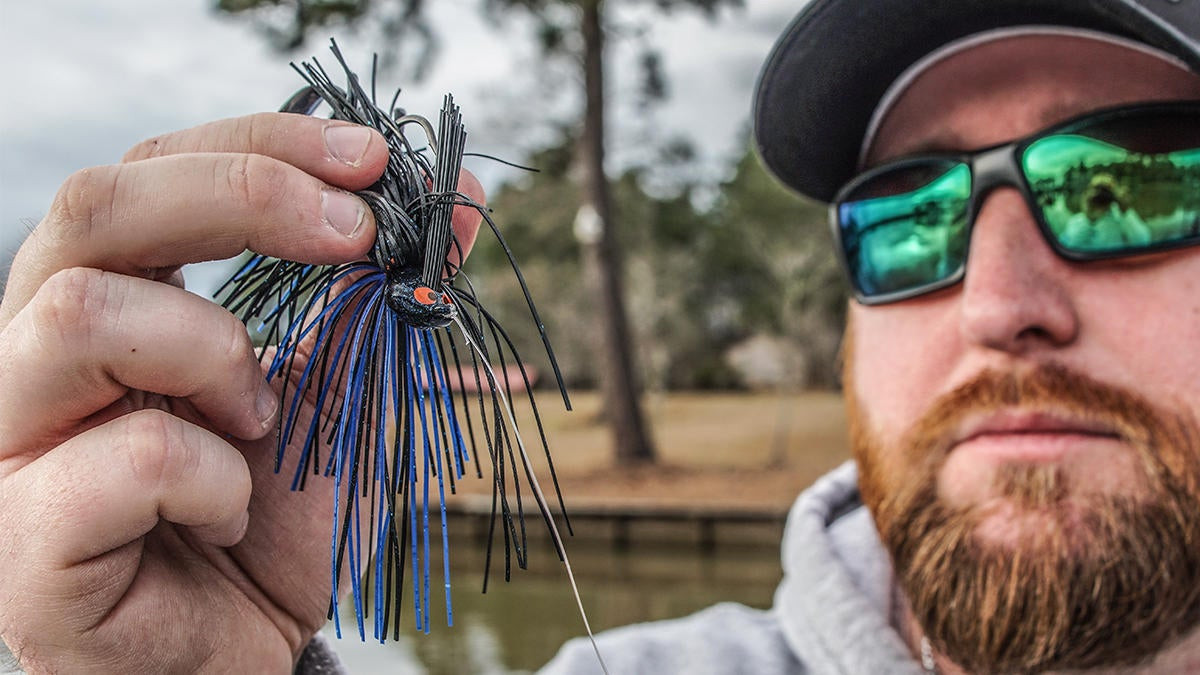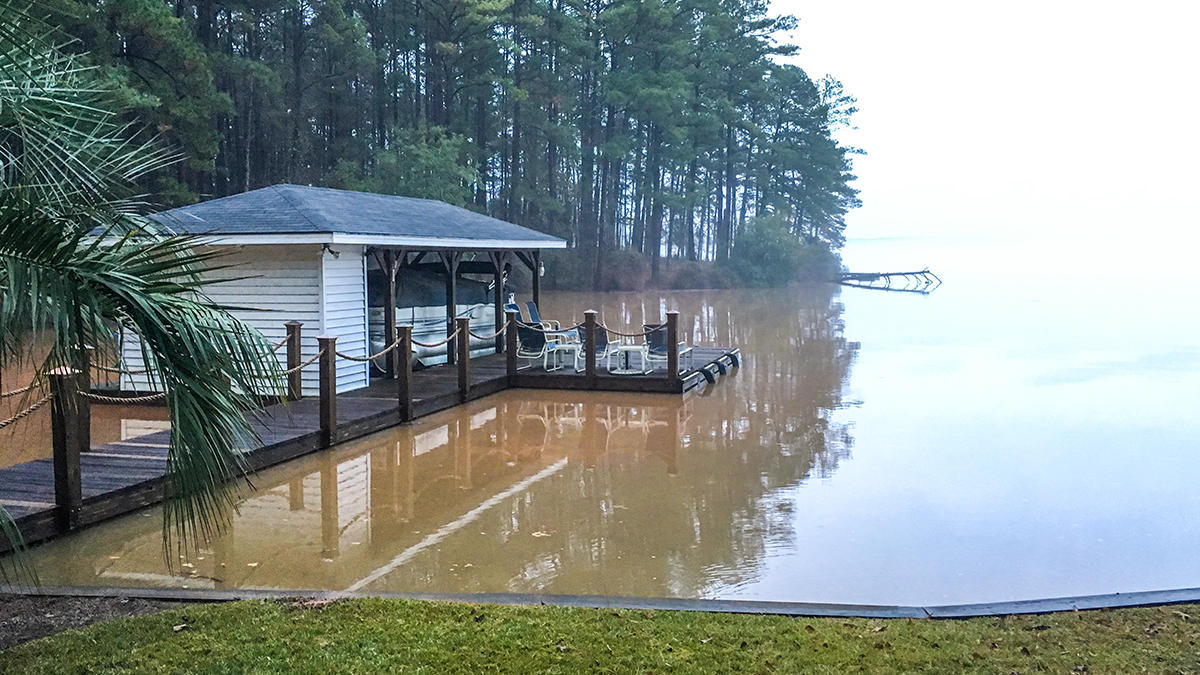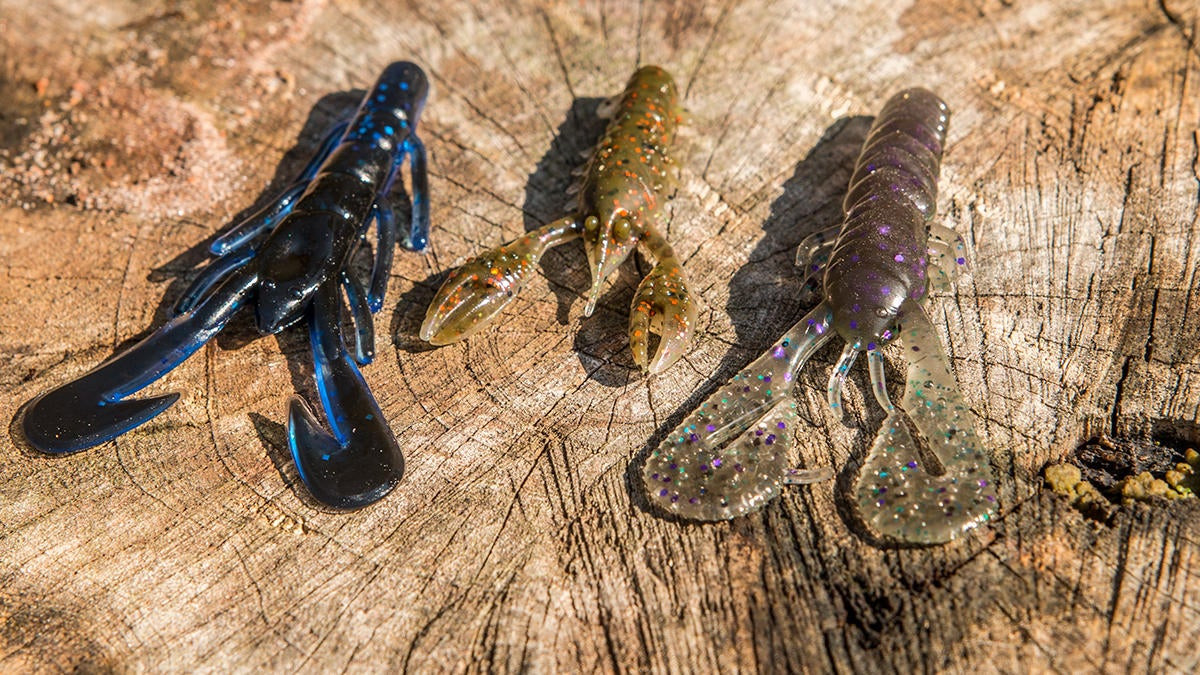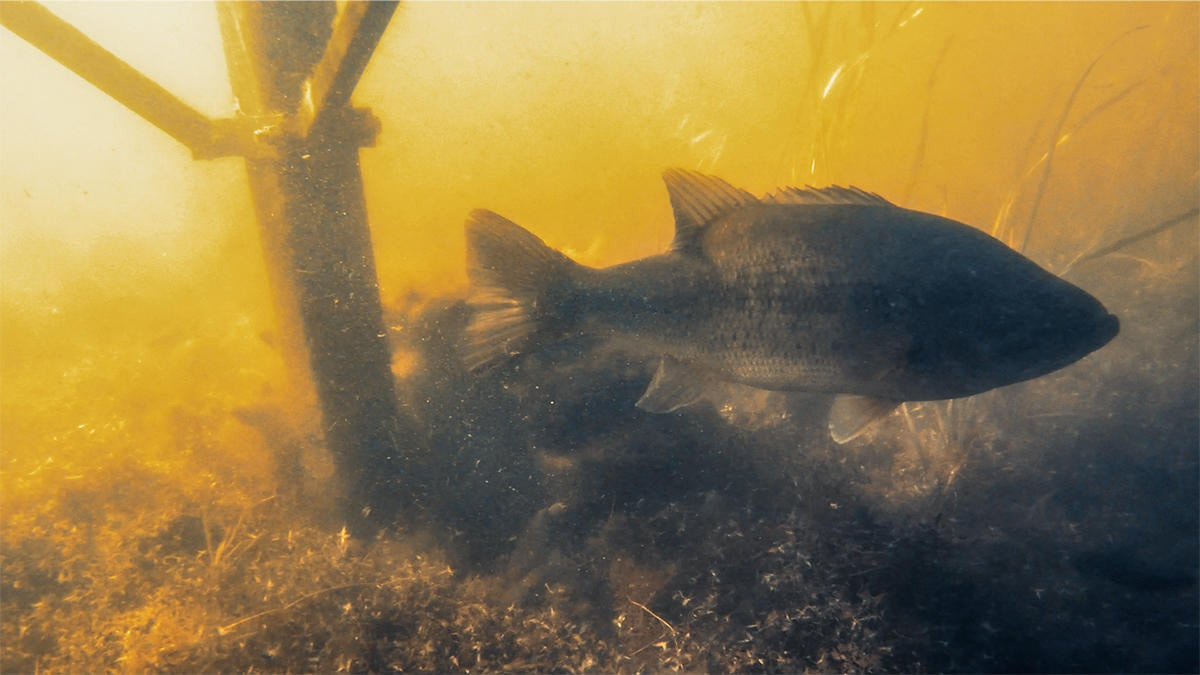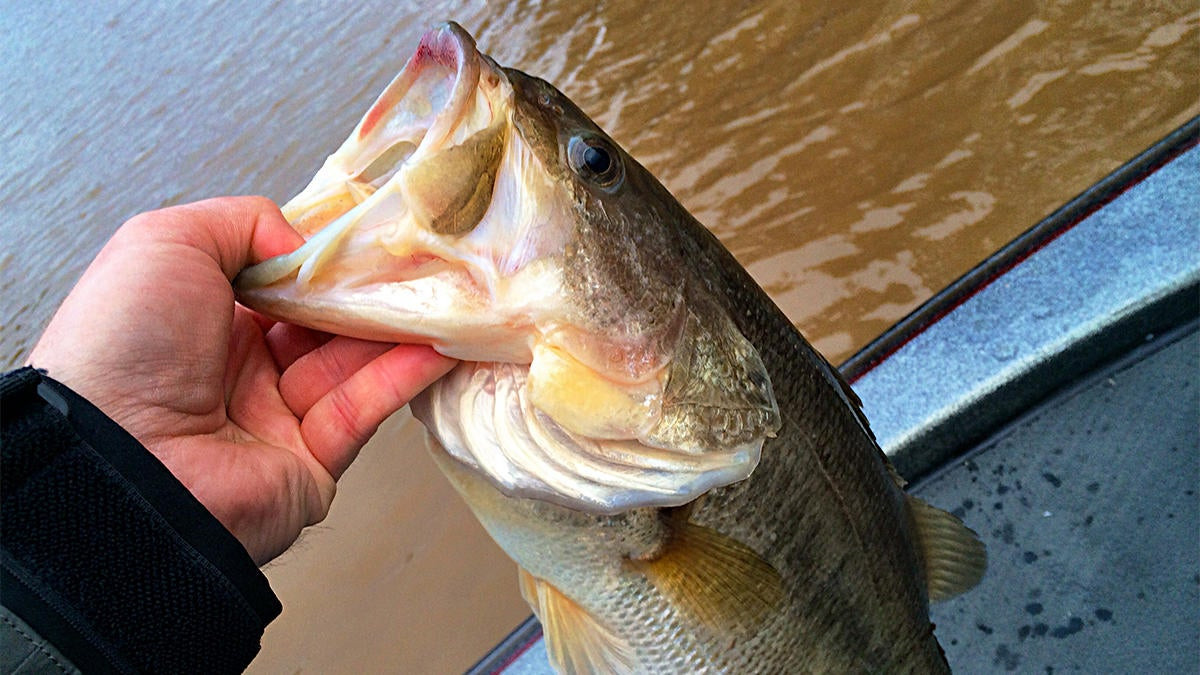Prespawn bass fishing with jigs can easily result in some of your biggest fish of the year. Although moving baits seem to get the bulk of the attention in this timeframe, skirted jigs can often be the most consistent producers during the multiple cold fronts that early season bass fishing is known for. Before you hit the lake, make sure you take these jig fishing tips into consideration.
1. Smaller jigs can mean big catches
While I have caught some big bass on larger jigs this time of year, my eyes have recently been opened to the sheer effectiveness of smaller, more compact jigs during the prespawn period. All of the sudden weather changes can result in pretty picky bass and it seems as if a more subtle jig gets more bites.
I have become especially fond of the Z-Man CrossEyeZ Flipping Jig. That’s not some thinly veiled sales pitch either. It skips like a dream and only gets snagged on very rare occasions. The size allows me to get plenty of bites with a real chance of fooling a giant, while the weedlessness lets me pitch it in the thickest stuff I can find when a big cold front hits. So whether or not you choose that particular jig is entirely up to you, but try to find one with similar qualities. A jig profile that allows for both quantity and quality is a big deal, especially right now.
I hardly go above a 3/8-ounce jig this time of year. I’ve found that I get a lot of bites as my jig falls after my initial cast and I think that a 1/2-ounce jig can drop too quickly and result in fewer of these bites.
2. Dock targets change with the water level
Boat docks are certainly one of the more popular targets for anglers pitching a jig. Something I’ve noticed, however, is that a lot of folks flip the same parts of a dock every single time, regardless of water level. I suggest trying an alternative method.
You’re probably going to deal with fluctuating water levels during the prespawn, especially with all of the precipitation the entire country has received this winter. Winter downpours and runoff from snow-and the expectation of heavy precipitation-can both raise and lower water levels very quickly. When this happens, remember to change your targets.
When the water rises, consider targeting the backs of docks. The bass will normally go shallower as the water level rises. You’ll find some fat prespawners underneath dock walkways, jetski lifts and swim ladders. If the water level drops, as it did during one of our shoots last week, it’s very important to target the front posts of docks and any brush piles that the owners may have put out.
Also worth noting, you may run into more suspended bass when the water suddenly drops out of the lake. This is when it can pay big dividends to downsize jigs to perhaps a 1/4-ounce finesse jig.
3. Jig trailers make a big difference
There are two schools of thought on this: Bulkier chunk-style jig trailers make you jig fall slower which can appeal to lethargic, cold-water bass. On the other hand, some believe that smaller, more compact trailers can appeal more to lethargic bass because of their less obtrusive profile.
I was partial to chunks for many years, but I’ll be honest-I’m catching a pile of fat prespawners using a smaller jig trailer. I keep hounding on sudden weather changes, but they’re an enormous deal this time of year. I feel like a smaller jig trailer is a little more well-received by picky post-frontal bass. I also like that a small trailer allows my jig to quickly and efficiently penetrate thick cover when weather causes the bass to get in the thick stuff.
Color selection doesn’t need to be complicated whatsoever. You’d be shocked to see my trailer collection. I’m using black/blue and green pumpkin the large majority of the time. I may use a green pumpkin color with a little orange tipped on the claws, but that’s about as crazy as I get.
Pictured above is the Zoom Ultra Vibe Speed Craw, the Z-Man TRD CrawZ and the Z-Man Turbo CrawZ.
4. Look for anything metal
I’ve caught some of my biggest prespawn bass flipping a jig around metal cover. I don’t care if it’s attached to a dock or not. If it’s in shallow water on a sunny bank, fish it every time. Big females will snug up to this metal to warm their egg sacks in preparation for the upcoming spawn. Metal holds and retains head better than wood, so try to train your eyes to look for this type of cover.
Jetski lifts and swim ladders are going to be your most prominent targets if I had to guess. Fish slow and try not to “ring the dinner bell” and hit the metal on your initial cast. If you can make a quiet and accurate cast, you’ll have a legitimate chance of catching a giant female.
It’s also important to check your line early and often when you’re targeting metal. I do not use braided line when doing this because a jagged corner or a protruding bolt will cut braided line like a hot knife through butter. A 20-pound fluorocarbon is much more abrasion resistant in this situation.
5. Don’t run from dirty water
Winter rains will leave many lakes looking like chocolate milk when the bass enter their prespawn period. If you’re not used to it, this sudden change can freak you out. But don’t ignore the dirty water. Here’s why I say that.
First of all, dirty water warms up the quickest because it’s denser than clear water. Temperature plays a huge role in prespawn fishing and if a bass can hang out somewhere that is 2 degrees warmer, it will. So you’re more likely to run across a solid, shallow-water jig bite in dirty water.
Also, bass can’t see very well in dirty water. This makes them more apt to rely on their other senses-especially the sense of feel-in order to feel secure and feed efficiently. Because of this, they’ll position themselves as close as they possible can to easily identifiable targets for anglers such as dock posts, stick-ups or boat lifts. This makes it much easier to fish through an area and quickly idenfify the most high-percentage targets.
As you start to hit the water in search of big prespawn bass this year, don’t forget to tie on a few jigs. Definitely keep your moving baits tied on, but jigs can produce consistently when Mother Nature throws you a curveball.


